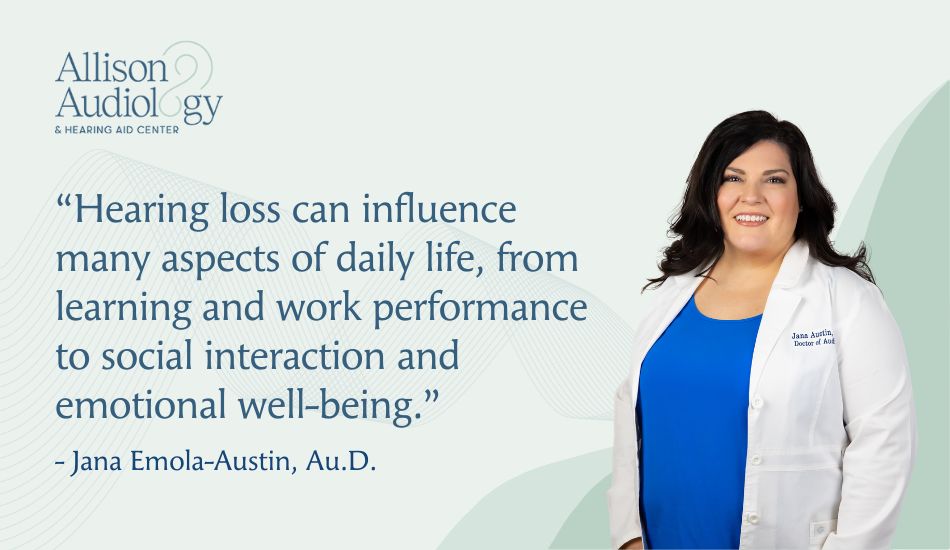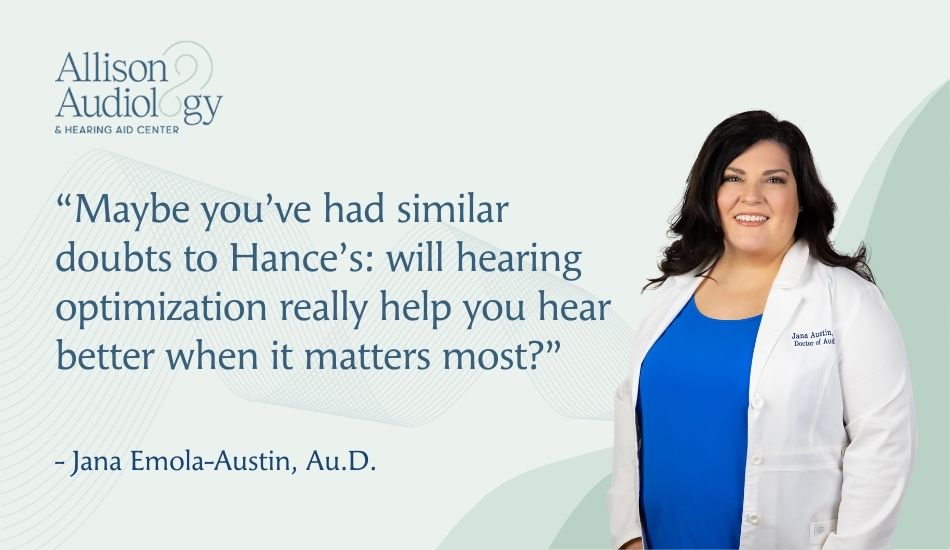
Hyperacusis vs. Misophonia: Understanding the Differences and Similarities
Hyperacusis and misophonia both involve sound sensitivity, but differ in symptoms and causes. Learn more about both.
Hyperacusis vs. Misophonia: Understanding the Differences and Similarities
Sep 27, 2024
Living with a sensitivity to sound can be challenging, especially when you’re unsure whether you’re dealing with hyperacusis, misophonia, or another auditory issue. While hyperacusis and misophonia both involve an increased sensitivity to sounds, they have distinct symptoms, causes, and treatment options.
Allison Audiology understands the complexities of hearing disorders and we are here to help you better understand the differences and similarities between hyperacusis and misophonia.
What Are Hyperacusis and Misophonia?
Hyperacusis and misophonia are both conditions that affect how people perceive sound, but they manifest in different ways:
Hyperacusis is a rare hearing disorder characterized by an increased sensitivity to everyday sounds. Individuals with hyperacusis find ordinary noises, like a running faucet or a ticking clock, unbearably loud or painful. The key aspect of hyperacusis is that it affects the perceived loudness of sound rather than a specific type of sound.
Misophonia, on the other hand, is a condition where certain sounds trigger strong emotional reactions such as anger, anxiety, or disgust. These sounds, often referred to as "trigger sounds," are usually everyday noises like chewing, breathing, or tapping. The key distinction here is that misophonia is related to an emotional response to specific sounds rather than a heightened sensitivity to all sounds.
Symptoms of Hyperacusis and Misophonia
A common treatment for hyperacusis involves the gradual introduction of sound at low levels to help desensitize the auditory system. This is often done using white noise or specialized sound generators.
Strong emotional reactions (e.g., anger, anxiety, or irritation) to specific trigger sounds
Physiological responses like increased heart rate, sweating, or muscle tension when exposed to trigger sounds
Avoidance of social situations or environments where trigger sounds are likely to occur
Difficulty concentrating when trigger sounds are present
Feelings of helplessness or frustration due to the inability to control the emotional response to certain sounds
Causes of Hyperacusis and Misophonia
Causes of Hyperacusis:
Hyperacusis is often linked to damage or dysfunction in the auditory pathways of the brain. Common causes include:
Prolonged exposure to loud sounds or a single intense noise event (like an explosion) can damage the inner ear.
Trauma to the head or ear can affect how sound is processed by the brain.
Conditions like Meniere's disease or Bell's palsy can lead to hyperacusis.
Migraines, multiple sclerosis, or autism spectrum disorder may increase the risk of developing hyperacusis.
Some medications that affect the auditory system can cause or worsen hyperacusis.
Causes of Misophonia:
The exact cause of misophonia is not well understood, but it is believed to be a neurological condition involving abnormal connections between the auditory and limbic systems in the brain. Potential factors include:
Misophonia can run in families, suggesting a genetic component.
Previous negative experiences associated with specific sounds may trigger a conditioned emotional response.
Misophonia may involve dysfunction in the parts of the brain responsible for processing sound and emotions.
Treatment Options for Hyperacusis and Misophonia
Treatment for Hyperacusis:
A common treatment for hyperacusis involves the gradual introduction of sound at low levels to help desensitize the auditory system. This is often done using white noise or specialized sound generators.
Counseling can help patients manage the emotional impact of hyperacusis. CBT, in particular, can teach coping strategies to reduce anxiety and stress associated with sound exposure.
In some cases, using earplugs or noise-canceling headphones can help manage discomfort, though it’s essential not to overuse them, as this can increase sensitivity over time.
For individuals with both hyperacusis and tinnitus, TRT combines sound therapy with counseling to help reduce sensitivity to sound.
Treatment for Misophonia:
CBT is often used to help patients understand and change their emotional reactions to trigger sounds. It may include exposure therapy, where patients are gradually exposed to trigger sounds in a controlled environment to reduce their impact over time.
Listening to soothing sounds or background noise through headphones can help mask trigger sounds and reduce the emotional response.
Techniques such as deep breathing, meditation, and mindfulness can help manage anxiety and emotional reactions associated with misophonia.
Avoiding environments with trigger sounds, using white noise machines, or wearing headphones with calming sounds can help manage symptoms.
How Are Hyperacusis and Misophonia Similar?
While hyperacusis and misophonia differ in their nature, they share some similarities:
Both conditions can significantly affect daily activities, social interactions, and overall quality of life. Individuals may avoid specific situations or environments to manage their symptoms.
Anxiety, stress, and social withdrawal are common in both conditions due to the constant struggle to cope with sound sensitivity.
Some treatments, such as sound therapy and cognitive-behavioral therapy, are used to manage both conditions, focusing on reducing sensitivity or emotional responses to sound.
When to Seek Professional Help
If you or a loved one is experiencing symptoms of hyperacusis or misophonia, it’s essential to consult a hearing care professional. Allison Audiology’s team of experienced audiologists can help diagnose these conditions, determine their causes, and create a personalized treatment plan to improve your quality of life.
Get Help With Hyperacusis and Misophonia at Allison Audiology
Dealing with hyperacusis or misophonia can be challenging, but you don’t have to face it alone. Schedule a comprehensive hearing assessment and start your journey toward better hearing health and well-being.
https://allisonaudiology.com/wp-content/uploads/2024/07/Schedule-Your-Hearing-Assessment-Today.jpg













